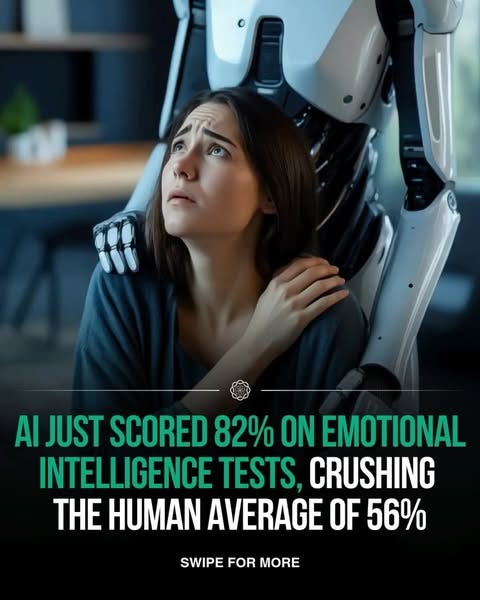I saw this the other day and it confirmed a suspicion I had: the emphasis on Emotional Intelligence—as it is popularly and widely understood—is mostly a load of bull, particularly in our cultural moment.
If a robot that has no real emotions is scoring higher on Emotional Intelligence than humans, what does that mean? I think some of you can already guess. But let’s unpack it.
Emotional intelligence (EI) is commonly defined as the ability to:
Recognize your own emotions
Regulate your emotions appropriately
Perceive emotions in others (empathy)
Manage relationships through effective communication, compassion, and conflict resolution
Use emotions to guide thinking and behavior in a constructive way
The concept was popularized by psychologist Daniel Goleman (strike one), who emphasized that EI often plays a more critical role in success—especially in leadership and collaboration—than raw IQ.
Why would Goleman emphasize that EI aids roles in success over raw IQ? Here is his theory:
People aren’t logical—they’re emotional.
Success often depends not on having the best idea, but on getting buy-in from others. High-EI individuals know how to communicate ideas in ways that resonate emotionally—not just logically.Conflict is inevitable. Resolution isn’t.
IQ may help you win an argument, but EI helps you de-escalate, build trust, and preserve relationships. That’s gold in any role where collaboration matters.Self-awareness prevents self-destruction.
Smart people can implode due to ego, reactivity, or blind spots. EI keeps you grounded, reflective, and responsive—not ruled by moods or triggers.Leadership is emotional labor.
Teams don’t follow IQ points. They follow people who make them feel understood, supported, and inspired. That’s pure EI.
And what kind of jobs would EI aid in success?
1. Leadership & Management
CEOs, team leads, pastors, executive directors
Why: Navigating personalities, motivating people, managing stress, adapting tone for different audiences
2. Sales & Marketing
Sales reps, account execs, brand strategists
Why: Success depends on empathy, persuasion, reading customer cues, and adjusting approach
3. Therapy & Counseling
Therapists, social workers, coaches
Why: It’s literally about listening, emotional attunement, and guiding others through complex inner lives
4. Teaching & Education
Teachers, professors, administrators
Why: Understanding students’ emotional needs, classroom management, motivating learning
5. Human Resources
HR managers, recruiters, conflict mediators
Why: Mediating tension, hiring for team dynamics, supporting employee wellbeing
6. Customer Service
Call center reps, hospitality staff, front desk workers
Why: Patience, de-escalation, problem-solving under pressure
7. Creative Leadership
Directors, producers, team creatives, ministry leads
Why: Balancing vision with team morale, giving feedback without crushing people, managing chaos with calm
Bringing us back to my original question, if AI “scores higher” on EI, it’s important to clarify how that’s being measured.
What’s Really Happening
When AI scores high on emotional intelligence tests, it’s not because it feels emotions—it’s because it's:
Exceptionally good at recognizing patterns in emotional language
Skilled at mirroring empathy, tone, and appropriate responses
Able to suppress biases and reactivity, which often trip up humans
Operating without ego, insecurity, or personal baggage
In short: AI can simulate emotional intelligence—better than humans who are tired, defensive, distracted, or unaware of their own emotional patterns.
But Here's the Catch
AI doesn’t have consciousness or emotions, so what it's doing is more like:
Predicting emotional cues
Performing empathy
Modeling emotionally intelligent behavior
It doesn’t actually experience compassion or get hurt by rejection. It’s essentially running code that behaves as if it’s emotionally intelligent.
So—What Is Emotional Intelligence Really?
If an unconscious system can outperform us at something we thought required deep feeling, maybe EI is:
Less about feeling, and more about recognizing, interpreting, and skillfully responding to feelings
A kind of emotional literacy, not emotional depth
That’s a bit sobering—but also empowering. Because it means EI is a set of skills we can learn, not just a trait we either have or don’t.
Let’s unpack where emotional intelligence goes wrong, how it can be weaponized, and whether a culture centered on emotion is even something we should aspire to:




